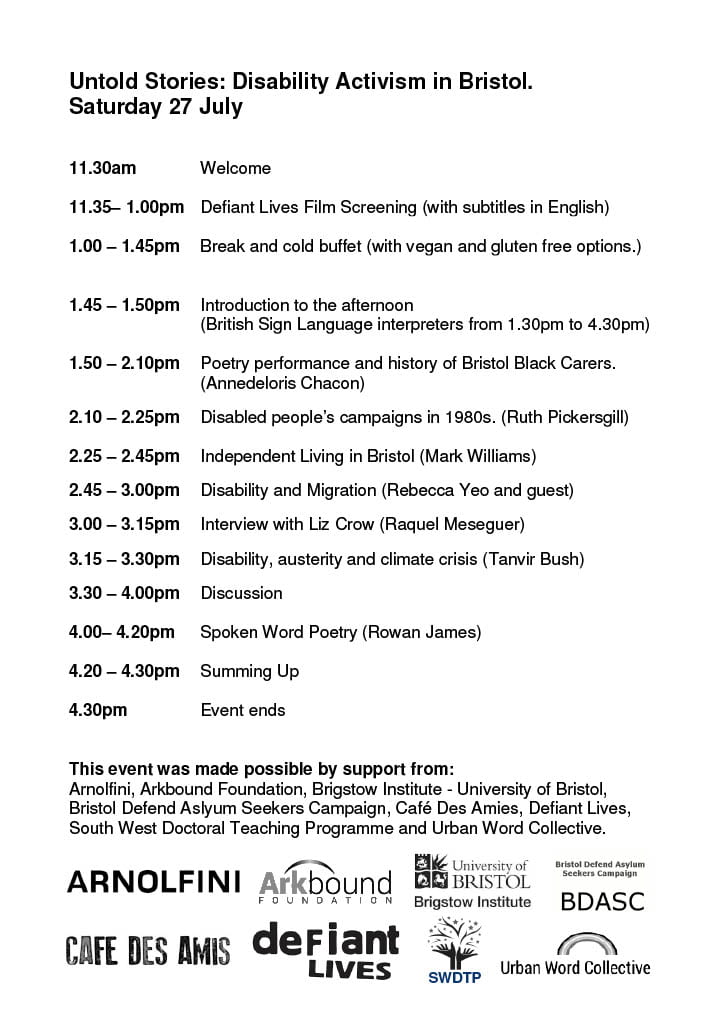An Exploration of the History, Context and Meaning of Disabled People’s Activism
How can a creative event on the untold stories of disabled activism provoke discussion, exploration and creative responses to both the intersections and tensions of activism in Bristol and the South West of England?

Bristol has a rich, and much explored history of political, cultural and community activism. However, accounts of Disabled people’s own stories, contributions, and intersections and solidarity within the wider histories of activism have often been missing.
In response, Disabled activists and academics have sought to co-produce new knowledge of these connections. These responses have challenged assumptions by, for example; arguing that interdependence and interconnectedness are shared concerns of disability and environmental activism (Abbott and Porter, 2013), that challenging ‘distinctions in human worth’ are essential for bringing systemic change for Disabled people and asylum seekers (Yeo, 2017) and by foregrounding Disabled people as creators and owners of our living histories (History of Place, 2018).
While there is recognition that ‘the disabled people’s movement has revolutionised global understandings of disability’ (Goodley, 2017), and while recent conversations have started between animal and disability activists (e.g. Taylor, 2017) exploring the historical, contextual and inter-relational nature of activism more broadly may yield further understandings of living well for Disabled and neuro-divergent people in a period of austerity, ecological crisis and global conflict.
What did the project involve?
This interdisciplinary and co-produced project aimed to build on this initial research and draw together Disabled activists, academics, community researchers, historians, artists and performers. The researchers aimed to provoke discussion, exploration and creative responses to both the intersections and tensions of activism in Bristol and the South West of England.
The main, initial activity was to organise and host an event, to begin an exploration of the history, context and meanings of Disabled people’s activism in relation to wider fields of activism.
This event included discussion of creative accounts of, and responses, to Disabled people’s activism. As a catalyst for this discussion the event screened the documentary ‘Defiant Lives’, film-work by the Misfits Theatre Group, artwork by The Disability Murals project, and spoken-word performance.
Who are the team and what do they bring?
- Mike Steel (Norah Fry Centre for Disability Studies / Policy Studies, University of Bristol)
- Andy Flack (History, University of Bristol) is an environmental historian who brings his experience as a visually impaired scholar and knowledge in Disability Studies to the research design and publications.
- George Ayres is an activist and independent researcher. He is a writer for the Bristol Cable and often interviews individuals on disabled rights activism and the importance of for disabled people to have a voice.
- Rebecca Yeo (Sociology, Politics and International Relations, University of Bristol) is a researcher who investigates experiences of disability and forced migration in the UK, and explore how intersectional injustices could be addressed.
- Urban Word Collective is a UK based company with a strong social arm, specialising in publishing eclectic poets and related live performance, with scope to work other forms of writing and transcend traditional boxes.
What were the results?
The project held the event ‘Untold Stories: Disability Activism in Bristol’ on the 27th of July 2018 at the Arnolfini. It featured the following schedule:

Through these activities the researchers hoped to develop a network of activists, communities and academics working in solidarity. They then sought further funding for a series of action-research informed events, provocations and performances.

